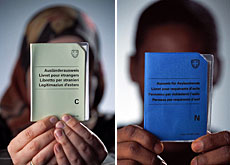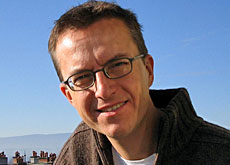Tough naturalisation laws criticised

The authors of a study on Swiss naturalisation policy have called for the country's strict legislation to be brought more into line with European Union norms.
Historians from Bern University conclude in their report, “Integration and Exclusion”, that Swiss laws are far too restrictive and outdated.
In Switzerland, foreign residents must wait 12 years before being eligible to apply for citizenship, compared with between four and ten years in EU states.
In most EU countries it is easier for children born to foreign residents to become naturalised than it is in Switzerland. And most citizenship decisions are taken at the town council level, which sets Switzerland apart from the rest of Europe.
The study highlights Swiss naturalisation policy from 1874 – less than 30 years after the founding of the modern Swiss state – to the present day.
Its authors say powers granted to local councils corresponded to 19th century needs but are not valid today, and should be changed.
“Special interests that can lead to subjective or biased decisions are no longer adequate in the very mobile age in which we now live,” said the study’s main author, Brigitte Studer.
The report recommends that the cantonal authorities take over responsibility for naturalisation decisions from the local councils, and a reduction of the number of years a foreign resident must wait before eligibility.
Trends
But the recommendations go against current trends. In 2004, Swiss voters rejected a simplified naturalisation procedure for second- and third-generation foreigners.
And the right-wing Swiss People’s Party has launched a campaign to enshrine the right of citizens to decide on naturalisation requests into the constitution, effectively upholding autonomy of the local councils.
The issue led to a nationwide debate a few years ago when voters in the town of Emmen near Lucerne turned down applicants from the Balkans, apparently only on the basis of their ethnic background. This pattern was repeated in other parts of central Switzerland.
The Federal Court later ruled that rejected citizenship applications must be justified, effectively banning local votes on naturalisation procedures.
The latest study contributes to the ongoing debate. It found that current policy dates back to decisions taken at the end of the 19th century, with laws becoming more restrictive over a period of six decades starting with the First World War.
It says that societal and political conflicts of interest have long played a role in naturalisation policy. It mentions the aim during the inter-war years to “safeguard public health” and fears of a communist infiltration during the Cold War.
The study says the Swiss expect applicants to live up to the image they have of themselves: “hard working, politically restrained, decent and of honest character”.
Over the past century, the naturalisation process has often been inconsistent and decisions arbitrary.
“The same, clear guidelines must be applied nationwide,” the authors concluded.
swissinfo
Foreign residents must wait at least 12 years before being eligible to apply for citizenship.
Foreigners married to Swiss nationals can take advantage of a simplified or “facilitated” procedure, reducing the number of years they have to wait (see related site, Federal Migration Office).
Successful applicants must show that they are integrated into Swiss society, comply with Swiss law and pose no threat to internal or external security.
The cantonal and local authorities are responsible for naturalisation procedures.
In 2005, a record 39,753 applications were accepted.
Foreign residents account for more than 20% of the population.

In compliance with the JTI standards
More: SWI swissinfo.ch certified by the Journalism Trust Initiative












You can find an overview of ongoing debates with our journalists here . Please join us!
If you want to start a conversation about a topic raised in this article or want to report factual errors, email us at english@swissinfo.ch.